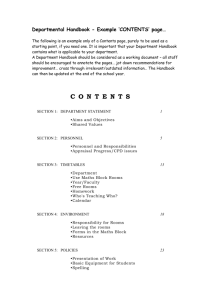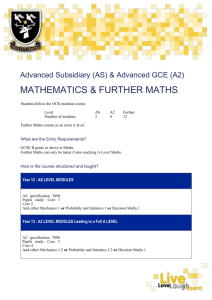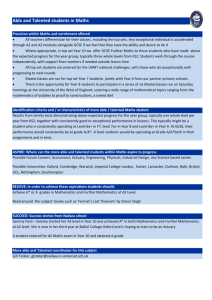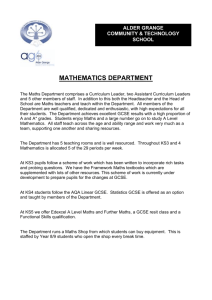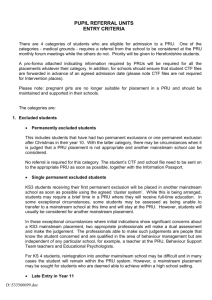Maths - Harbour Pupil Referral Unit
advertisement
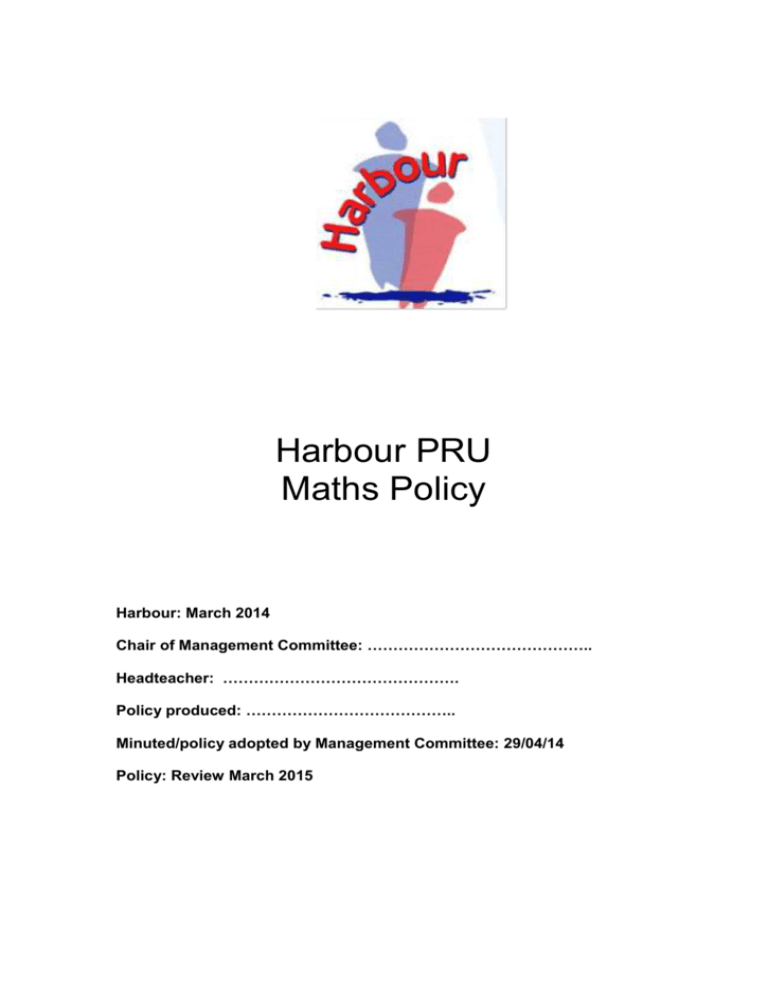
Harbour PRU Maths Policy Harbour: March 2014 Chair of Management Committee: …………………………………….. Headteacher: ………………………………………. Policy produced: ………………………………….. Minuted/policy adopted by Management Committee: 29/04/14 Policy: Review March 2015 HARBOUR PRU LOWESTOFT Numeracy Policy General Statement Numeracy is a life skill and is important in everyday living. It is a proficiency which involves confidence and competence with numbers and measures. It requires an understanding of the number system, a repertoire of computational skills and an inclination and ability to solve number problems in a variety of contexts. It also demands practical understanding of the ways in which information is gathered by counting and measuring, and is presented in graphs, diagrams, charts and tables. (National Framework for Teaching Mathematics (1999) At Harbour our students are full-time or dual registered, and all have experienced difficulties in their mainstream education. Our aim is to prepare them for a successful return to mainstream education, or the next phase of their education. During this time we will help them acquire the skills necessary to become numerate and confident mathematicians by developing their knowledge and understanding of mathematics. Aims We aim to achieve this by: Helping students develop a positive attitude towards mathematics; Developing students’ confidence in the use of number; Supporting the premise that, “A student is more likely to succeed if they are not afraid of failure”, by creating a sufficiently safe environment to encourage risk taking, acknowledging that we can learn from making errors; Encouraging talk and discussion to explore ideas and enabling students to learn from each other; Developing students’ mathematical vocabulary; Using games to present mathematics in a fun and engaging way ; Setting challenging targets with high expectations for all pupils; Offering a variety of approaches to teaching and learning to engage and motivate pupils and demand their active participation; Enabling students to apply their mathematical knowledge and skills to other areas of the curriculum by making cross curricular links explicit. Teacher/PRU/Staff Handbook/Curriculum Policies Teaching and Learning Full-time students receive a minimum of three Maths lessons per week, each of 50 minutes duration. All dual registered students receive one Maths lesson per week of 50 minutes duration. Each maths lesson includes the three part structure of mental/oral activity, main activity and a plenary. Learning outcomes are displayed, explained and referred to throughout the lesson. A variety of teaching and learning styles are used. Lessons are differentiated to meet individuals’ needs. Emphasis is placed on developing mental calculations. Curriculum content The full-time groups at Harbour usually consist of all KS2 or all KS3 students. The planned programme for these groups therefore incorporate learning objectives from both the framework for primary and secondary mathematics and, when possible, is planned in conjunction with schemes of work from their mainstream school. The main aims of the maths lessons for part-time groups are to help students develop a positive attitude towards mathematics and develop their confidence in the use of number. We aim to achieve this by using a variety of different games to engage students in a fun way which also helps them develop and improve social skills. Assessment, Monitoring and Evaluation The Maths Subject Leader is responsible for: Reviewing Numeracy Policy; Overseeing long and medium planning of teachers; Some teaching of Maths for full-time students; Monitoring standards of planning, teaching and learning; Ensuring Assessing and Monitoring of full-time students individual progress working closely with SENCo and the BSA with responsibility for Assessment ; Supporting colleagues in their teaching of Maths. Liaising with students’ mainstream schools to inform planning. Teacher/PRU/Staff Handbook/Curriculum Policies All full-time students are formally assessed on entry using the Progress in Maths (GL assessment). These are a series of 11 tests which provide ongoing assessment in maths for 4-14 year olds. These assessments provide an overall attainment in mathematics. Pupils’ levels are recorded on their individual assessment profile and the next test in the series is carried out the following term to monitor progress. Assessing Pupil Progress is then ongoing throughout every lesson and monitored through the use of APP grids. All students work towards achieving Harbour Unit Awards. Each unit identifies the intended learning objectives and outcomes, as well as being a record of pupil progress and achievement. Units include programmes of work from all four attainment targets. Policy reviewed and updated: March 2014 Policy to be reviewed March 2015 Teacher/PRU/Staff Handbook/Curriculum Policies

